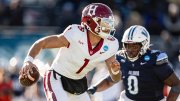Faculty of Arts and Sciences (FAS) interim dean Jeremy R. Knowles—whose struggle with prostate cancer was disclosed last week, when he was forced to miss a faculty meeting (see “FAS Dean Is Ill; Curriculum Review Continues,” Breaking News, posted April 18)—has been succeeded on an acting basis by David R. Pilbeam, Ford professor of human evolution. Pilbeam served on the faculty’s Task Force on General Education, whose recommendations are the basis of draft legislation the faculty is now debating as it completes the College’s wholesale curriculum review (see “General Education, Finally Defined,” March-April, page 68).
In a statement circulated this afternoon, President Derek Bok informed the faculty, “I am saddened to say that in recent days Jeremy’s condition has taken a turn for the worse. In the circumstances, I have asked Professor David Pilbeam to step in as interim dean of the FAS. Having worked with David over many years, I know him to be a man of the highest integrity, devoted to Harvard and to the Faculty of Arts and Sciences. His long experience and familiarity with University Hall make him the ideal person to assume responsibility at this difficult moment.
“For now,” Bok’s statement continued, “our thoughts are with Jeremy and his family. No one has loved Harvard more or worked more tirelessly in its behalf. In his absence, we will do our best to carry on with the important work of the Faculty and the University—as Jeremy, more than anyone, would wish.”
Pilbeam also released a statement: “ I am sure that I speak for all in the Faculty of Arts and Sciences in wishing Jeremy a quick and complete recovery. Our thoughts and prayers are with him and his family during this very difficult time.
“Even though the circumstances under which I have been asked to serve as dean on an interim basis are absolutely not what I would have wished, I am pleased to serve the FAS and the University in any way that I can.”
During the academic year, Pilbeam has also served as senior adviser to Harvard College dean Benedict H. Gross; the two jointly cochaired the committee that oversees undergraduate concentrations. Pilbeam was previously associate dean for undergraduate education and led recent efforts to improve academic advising. He thus comes to his new responsibilities with broad experience in undergraduate education, during the final weeks of faculty work on and legislation concerning the curriculum.
Nonetheless, the transition must cause some additional stress within FAS. Knowles, who was dean from July 1991 through June 2002 (see “A Dean for All Weathers,” May-June 2002, page 48), agreed to resume the leadership position in University Hall on an interim basis for the current academic year. He did so at Bok’s request, as the two men filled the vacancies created by the resignations of Lawrence H. Summers as president and William C. Kirby as dean in early 2006. Bok’s permanent successor, Drew Gilpin Faust, was named president-elect on February 11, and will assume office on July 1. She noted in an interview last week that she is spending much of her time on the search for a permanent FAS dean (as well as filling other decanal vacancies); for that search, she said, only internal candidates are being considered, making a transition relatively swift when she reaches her decision.
During the academic year, Knowles published letters to the faculty explaining FAS’s financial circumstances and the recent and likely growth of the professoriate—the latter strongly focused on the intellectual future of the College and Graduate School of Arts and Sciences (see, respectively, “House-Poor,” January-February, page 58, and “Growth Spurt,” May-June, page 62)—and was contemplating a third such missive. All were intended to form a basis of common understanding as faculty members and their new leader shape and pursue FAS’s agenda for the next decade. Knowles also oversaw the year-long debate on general education, and worked with a separate task force—chaired by graduate school dean Theda Skocpol—concerning improvements in teaching and pedagogy.
Knowledge of Knowles’s illness was closely held within the University, and it seemingly had no effect on his work. During the winter, however, his health worsened, acutely so in mid April, causing the initial announcement of his absence last week; at that time, as reported, Knowles hoped for a course of care that would lessen what Bok described as “acute and persistent pain,” enabling him to return to work in short order. Today’s announcement makes clear that that will not be possible.
As reported, final discussion of the motion on general education is scheduled for Tuesday, April 24. If all amendments are addressed on time, the faculty will begin a full debate at its regularly scheduled meeting on May 1, from which may emerge the last component of the comprehensive undergraduate curriculum revision begun four years ago.




